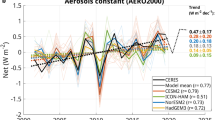Abstract
Damages due to climate change are expected to increase with global warming, which could be limited directly by solar geoengineering. Here we analyse the views of 723 negotiators and scientists who are involved in international climate policy-making and who will have a considerable influence on whether solar geoengineering will be used to counter climate change. We find that respondents who expect severe global climate change damages and who have little confidence in current mitigation efforts are more opposed to geoengineering than respondents who are less pessimistic about global damages and mitigation efforts. However, we also find that respondents are more supportive of geoengineering when they expect severe climate change damages in their home country than when they have more optimistic expectations for the home country. Thus, when respondents are more personally affected, their views are closer to what rational cost–benefit analyses predict.
This is a preview of subscription content, access via your institution
Access options
Access Nature and 54 other Nature Portfolio journals
Get Nature+, our best-value online-access subscription
$29.99 / 30 days
cancel any time
Subscribe to this journal
Receive 12 print issues and online access
$209.00 per year
only $17.42 per issue
Buy this article
- Purchase on Springer Link
- Instant access to full article PDF
Prices may be subject to local taxes which are calculated during checkout



Similar content being viewed by others
Data availability
The dataset necessary to reproduce the findings of this study is publicly available at https://doi.org/10.5281/zenodo.3341559. The data used from BHM can be accessed at https://web.stanford.edu/~mburke/climate/data.html. The data for the ND-GAIN index can be accessed at https://gain.nd.edu/our-work/country-index/. Data for GDP per capita in 2015 are from the World Bank’s Development Indicators and are available at https://databank.worldbank.org/data/source/world-development-indicators. Data for CO2 per capita in 2015 are from the European Commission and are available at http://edgar.jrc.ec.europa.eu/overview.php?v=CO2andGHG1970-2016.
References
Rogelj, J. et al. Paris Agreement climate proposals need a boost to keep warming well below 2 °C. Nature 534, 631–639 (2016).
Crutzen, P. J. Albedo enhancement by stratospheric sulfur injections. A contribution to resolve a policy dilemma?. Climatic Change 77, 211–220 (2006).
Wigley, T. M. L. A combined mitigation/geoengineering approach to climate stabilization. Science 314, 452–454 (2006).
Geoengineering the Climate: Science, Governance and Uncertainty (The Royal Society, 2009).
Victor, D. G., Morgan, M. G., Apt, J., Steinbrunner, J. & Ricke, K. The geoengineering option: a last resort against global warming? Foreign Aff. 88, 64–76 (2009).
Robock, A. Whither geoengineering? Science 320, 1166–1167 (2008).
Tilmes, S., Müller, R. & Salawitch, R. The sensitivity of polar ozone depletion to proposed geoengineering schemes. Science 320, 1201–1204 (2008).
Tilmes, S., Garcia, R. R., Kinnison, D. E., Gettelman, A. & Rasch, P. J. Impact of geoengineered aerosols on the troposphere and stratosphere. J. Geophys. Res. 114, D12305 (2009).
Haywood, J. M., Jones, A. & Jones, G. S. The impact of volcanic eruptions in the period 2000-2013 on global mean temperature trends evaluated in the HadGEM2-ES climate model. Atmos. Sci. Lett. 15, 92–96 (2014).
Irvine, P. J., Sriver, R. L. & Keller, K. Tension between reducing sea-level rise and global warming through solar-radiation management. Nat. Clim. Change 2, 97–100 (2012).
IPCC Climate Change 2013: The Physical Science Basis (eds Stocker, T. F. et al.) (Cambridge Univ. Press, 2013).
Tollefson, J. Sucking carbon dioxide from air is cheaper than scientists thought. Nature 558, 173 (2018).
Boucher, O. et al. Reversibility in an Earth System model in response to CO2 concentration changes. Environ. Res. Lett. 7, 024013 (2012).
Scott, V., Haszeldine, R. S., Tett, S. F. B. & Oschlies, A. Fossil fuels in a trillion tonne world. Nat. Clim. Change 5, 419–423 (2015).
Azar, C., Lindgren, K., Larson, E. & Möllersten, K. Carbon capture and storage from fossil fuels and biomass—costs and potential role in stabilizing the atmosphere. Climatic Change 74, 47–79 (2006).
Tollefson, J. Geoengineering debate shifts to UN environment assembly. Nature 567, 156 (2019).
Robock, A., Marquardt, A., Kravitz, B. & Stenchikov, G. Benefits, risks, and costs of stratospheric geoengineering. Geophys. Res. Lett. 36, L19703 (2009).
McClellan, J., Keith, D. W. & Apt, J. Cost analysis of stratospheric albedo modification delivery systems. Environ. Res. Lett. 7, 034019 (2012).
Vaughan, N. E. & Lenton, T. M. A review of climate geoengineering proposals. Climatic Change 109, 745–790 (2011).
IPCC Global Warming of 1.5 °C (World Meteorological Organization, 2018).
Corner, A., Parkhill, K., Pidgeon, N. & Vaughan, N. E. Messing with nature? Exploring public perceptions of geoengineering in the UK. Glob. Environ. Change 23, 938–947 (2013).
Winickoff, D. E., Flegal, J. A. & Asrat, A. Engaging the Global South on climate engineering research. Nat. Clim. Change 5, 627–634 (2015).
Pidgeon, N., Parkhill, K., Corner, A. & Vaughan, N. Deliberating stratospheric aerosols for climate geoengineering and the SPICE project. Nat. Clim. Change 3, 451–457 (2013).
Corner, A. & Pidgeon, N. Geoengineering, climate change scepticism and the ‘moral hazard’ argument: an experimental study of UK public perceptions. Phil. Trans. R. Soc. A 372, 20140063 (2014).
Mahajan, A., Tingley, D. & Wagner, G. Fast, cheap, and imperfect? US public opinion about solar geoengineering. Env. Polit. 28, 523–543 (2019).
Bostrom, A. et al. Causal thinking and support for climate change policies: international survey findings. Glob. Environ. Change 22, 210–222 (2012).
Hamilton, C. Earthmasters: The Dawn of the Age of Climate Engineering (Yale Univ. Press, 2013).
Anshelm, J. & Hansson, A. Battling Promethean dreams and Trojan horses. Revealing the critical discourses of geoengineering. Energy Res. Soc. Sci. 2, 135–144 (2014).
Bellamy, R., Chilvers, J., Vaughan, N. E. & Lenton, T. M. ‘Opening up’ geoengineering appraisal. Multi-criteria mapping of options for tackling climate change. Glob. Environ. Change 23, 926–937 (2013).
Scholte, S., Vasileiadou, E. & Petersen, A. C. Opening up the societal debate on climate engineering. How newspaper frames are changing. J. Integr. Environ. Sci. 10, 1–16 (2013).
Burns, E. T. et al. What do people think when they think about solar geoengineering? A review of empirical social science literature, and prospects for future research. Earths Futur. 4, 536–542 (2016).
Corner, A., Pidgeon, N. & Parkhill, K. Perceptions of geoengineering. Public attitudes, stakeholder perspectives, and the challenge of ‘upstream’ engagement. WIREs. Clim. Change 3, 451–466 (2012).
Wright, M. J., Teagle, D. A. H. & Feetham, P. M. A quantitative evaluation of the public response to climate engineering. Nat. Clim. Change 4, 106–110 (2014).
Corner, A. & Pidgeon, N. Like artificial trees? The effect of framing by natural analogy on public perceptions of geoengineering. Climatic Change 130, 425–438 (2015).
Luokkanen, M., Huttunen, S. & Hildén, M. Geoengineering, news media and metaphors: framing the controversial. Public Underst. Sci. 23, 966–981 (2014).
Scheer, D. & Renn, O. Public perception of geoengineering and its consequences for public debate. Climatic Change 125, 305–318 (2014).
Pidgeon, N. et al. Exploring early public responses to geoengineering. Phil. Trans. R. Soc. A 370, 4176–4196 (2012).
Merk, C., Pönitzsch, G., Kniebes, C., Rehdanz, K. & Schmidt, U. Exploring public perceptions of stratospheric sulfate injection. Climatic Change 130, 299–312 (2015).
Goes, M., Tuana, N. & Keller, K. The economics (or lack thereof) of aerosol geoengineering. Clim. Change 109, 719–744 (2011).
Bahn, O., Chesney, M., Gheyssens, J., Knutti, R. & Pana, A. C. Is there room for geoengineering in the optimal climate policy mix? Environ. Sci. Policy 48, 67–76 (2015).
Bickel, J. E. & Agrawal, S. Reexamining the economics of aerosol geoengineering. Clim. Change 119, 993–1006 (2013).
Heutel, G., Moreno-Cruz, J. & Shayegh, S. Solar geoengineering, uncertainty, and the price of carbon. J. Environ. Econ. Manage. 87, 24–41 (2018).
Burke, M., Hsiang, S. M. & Miguel, E. Global non-linear effect of temperature on economic production. Nature 527, 235–239 (2015).
Gardiner, S. (ed.) in Climate Ethics (eds Gardiner, S. M. et al.) 284–312 (Oxford Univ. Press, 2010).
Bodansky, D. The who, what, and wherefore of geoengineering governance. Clim. Change 121, 539–551 (2013).
Barrett, S. The incredible economics of geoengineering. Environ. Resour. Econ. 39, 45–54 (2008).
Lange, A., Vogt, C. & Ziegler, A. On the importance of equity in international climate policy. An empirical analysis. Energy Econ. 29, 545–562 (2007).
Lange, A., Löschel, A., Vogt, C. & Ziegler, A. On the self-interested use of equity in international climate negotiations. Eur. Econ. Rev. 54, 359–375 (2010).
Kesternich, M. Minimum participation rules in international environmental agreements. Empirical evidence from a survey among delegates in international climate negotiations. Appl. Econ. 48, 1047–1065 (2016).
Karlsson, C., Parker, C., Hjerpe, M. & Linnér, B.-O. Looking for leaders: perceptions of climate change leadership among climate change negotiation participants. Glob. Environ. Polit. 11, 89–107 (2011).
Dannenberg, A., Sturm, B. & Vogt, C. Do equity preferences matter for climate negotiators? An experimental investigation. Environ. Resour. Econ. 47, 91–109 (2010).
Dannenberg, A., Zitzelsberger, S. & Tavoni, A. Climate negotiators’ and scientists’ assessments of the climate negotiations. Nat. Clim. Change 7, 437–442 (2017).
Kesternich, M., Löschel, A. & Ziegler, A. Negotiating Weights for Burden Sharing Rules Among Heterogeneous Parties: Empirical Evidence from a Survey Among Delegates in International Climate Negotiations Discussion Paper No. 14-031 (ZEW– Centre for European Economic Research, 2014).
Ricke, K., Drouet, L., Caldeira, K. & Tavoni, M. Country-level social cost of carbon. Nat. Clim. Change 8, 895–900 (2018).
Acknowledgements
The work was financially supported by the European Union Horizon 2020 Program, Action ERC-2014-STG, Project HUCO, grant number 636746.
Author information
Authors and Affiliations
Contributions
A.D. and S.Z. contributed equally to this work.
Corresponding author
Ethics declarations
Competing interests
The authors declare no competing interests.
Additional information
Peer review information: Nature Climate Change thanks Karen Parkhill, Michael Siegrist and Gernot Wagner for their contribution to the peer review of this work.
Publisher’s note: Springer Nature remains neutral with regard to jurisdictional claims in published maps and institutional affiliations.
Supplementary information
Supplementary Information
Supplementary Note 1, Tables 1–10, Fig. 1, methods and references.
Rights and permissions
About this article
Cite this article
Dannenberg, A., Zitzelsberger, S. Climate experts’ views on geoengineering depend on their beliefs about climate change impacts. Nat. Clim. Chang. 9, 769–775 (2019). https://doi.org/10.1038/s41558-019-0564-z
Received:
Accepted:
Published:
Issue Date:
DOI: https://doi.org/10.1038/s41558-019-0564-z
This article is cited by
-
Public perceptions and support of climate intervention technologies across the Global North and Global South
Nature Communications (2024)
-
Presenting balanced geoengineering information has little effect on mitigation engagement
Climatic Change (2024)
-
Determining the willingness to link climate and trade policy
Climatic Change (2023)
-
Public response to solar geoengineering: how media frames about stratospheric aerosol injection affect opinions
Climatic Change (2023)
-
Determining the credibility of commitments in international climate policy
Nature Climate Change (2022)



